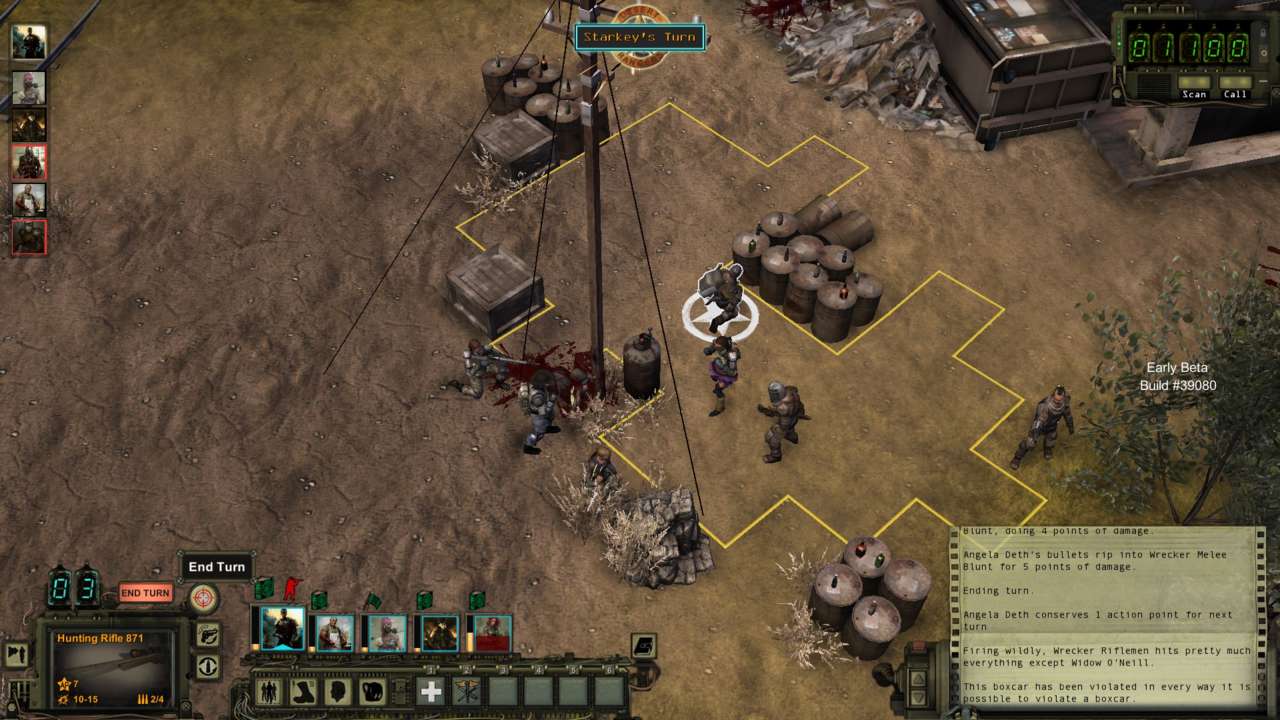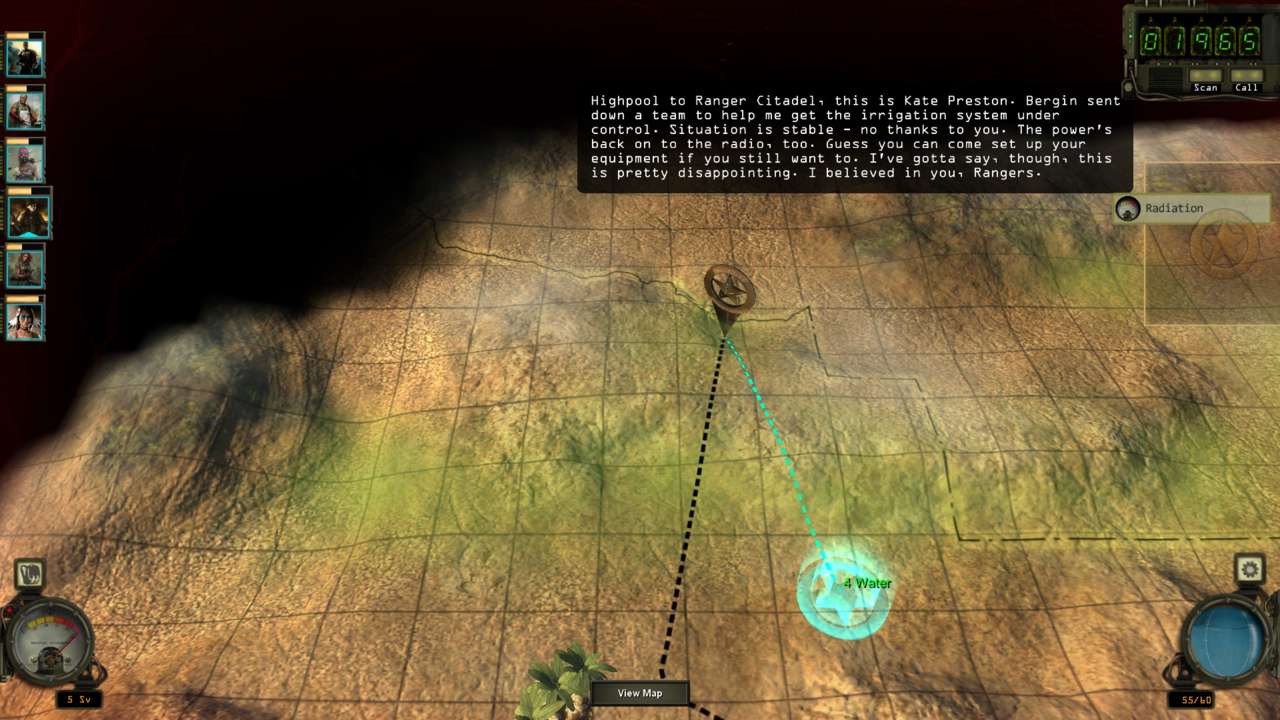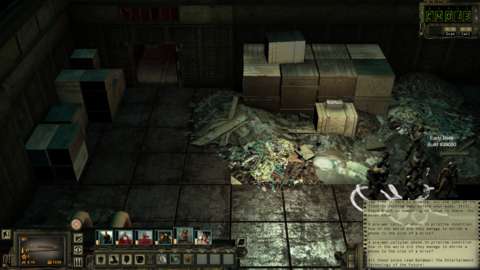Wasteland 2 Early Access Review
Wandering in the wastes...again.
GameSpot's early access reviews evaluate unfinished games that are nonetheless available for purchase by the public. While the games in question are not considered finished by their creators, you may still devote money, time, and bandwidth for the privilege of playing them before they are complete. The review below critiques a work in progress, and represents a snapshot of the game at the time of the review's publication.
Any discussion of Wasteland must begin with its legacy. The first game was one of those truly seminal works. The eponymous setting and morbid humor stand among the best, and they've been adapted and canonized in the annals of game history. Over 25 years later, Wasteland 2 seeks to pick up where its predecessor left off. As one of the first games to receive huge support through crowd funding and one of the first to hit Steam's early access program, Wasteland 2 can't avoid being caught between its origins and its 21st-century funding and distribution. Thankfully, it deftly manages to balance everything and is one of the best postapocalyptic role-playing games to emerge in a long time--and it's not even finished yet.

Taking place some 15 years after the first game, Wasteland 2 is set in the same irradiated version of the American Southwest as the 1988 original. Many of the choices and quests from the first game are referenced as either plot points or Easter eggs. The game borrows heavily from the formula of the original: you begin as a team of four potential recruits to the Rangers, a group of paramilitary police officers looking to reorganize and protect the wasteland that what once was Southern Arizona. This team is yours to mold, but you’ll want to put a lot of care and effort into it. Most levels are cramped but loaded with an insane number of things to discover, and to access every area, you need a well-balanced team that can handle anything that’s thrown its way.
When creating my party, I was excited to see that I could accurately role-play as myself. I picked “American Indian” for my race and “Indigenous” as my religion. That detail goes beyond just picking a few cosmetic options and setting off for adventure, though. You’re encouraged to write a backstory for yourself and your characters, and while it may be a bit much to hope that the game could parse that information and use it later, the option calls to mind the pen-and-paper RPGs that inspired the original Wasteland. Information as apparently insignificant as whether or not your characters are smokers, and what brand of cigarettes they prefer, have actual consequence. You shouldn’t, however, get too cavalier when building your party, unless you’re looking for an additional challenge. Wasteland 2’s structure encourages extreme specialization. Points that you can allocate to skills are few and far between, and trying to create a jack-of-all-trades usually results in a character that can’t do anything particularly well, especially in the late game. Instead, Wasteland 2 wants you to make characters distinct so that they mutually rely on one another. While that system drives home party cohesion with severe consequences for death, I wish the dialogue system were implemented so that side characters got more attention from time to time; individual party members’ personalities are typically overshadowed by the character you designate as your primary conversationalist.
Wasteland 2 is one of the best postapocalyptic role-playing games to emerge in a long time--and it's not even finished yet.
While Wasteland 2 might be too rigid to allow you to actually play a role in exactly the way you want, nearly everything else is extremely well executed. Most of the areas and towns you’ll explore are small, which may initially seem like a problem, but there’s a lot more going on than you’d suspect at first glance. Nearly every screen in the game has something interesting in it, from hidden safes to secret caves, and most people will not be able to see everything on a first playthrough. Again, that might come off as a problem--forcing you to play more than once, and artificially padding the length--but most of the things you miss aren't necessary. Instead, they're there to help make the world feel whole. You won’t miss them, but they are surprisingly important. Shadowrun: Dragonfall (Wasteland’s closest recent analogue) suffered from a lack of extras; it was a big game but felt cramped because it was possible to see absolutely everything in every level. The loot system here reinforces the sense of scale. Most items are useless, but many have their own back stories and mythologies surrounding them, while others give you access to entirely new areas. Such specific details go a long way towards making the world feel organic, much in the same way that the thousands of useless wheels of cheese and brooms in an Elder Scrolls game helps bring its world to life.

Supporting that sense of a deep world is a fluid application of typical RPG character classes. You can train almost any character in any skill, but again, some forethought can help quite a bit. If you have a character you want to specialize in melee combat, you probably want to make sure he has a decent speed stat so he can maneuver around the battlefield effectively. While you're doing that, making him a combat medic and a surgeon might not be a bad idea either. If any party member gets into trouble, he can move off the front lines and heal the victim before he bleeds out. That combination of skills is rare in most games, where melee combat and healing would be split between two different characters. There are a lot of skills you need on your journey, though, and if you want to have someone who can repair machines, handle computers, pick locks, crack open safes, and wield a sniper rifle--all skills you'd expect in a classic rogue--you can't level him up well enough to use him effectively.
There are a lot of raiders and bandits out in the wild, and combat encounters are random. When a hostile group approaches, you have the option to either attack head-on or make a skill check to lose them. If you stand and fight, you often face three to ten bandits on a variety of different minimaps. From here, the game becomes a lot more tactical. Each of your characters has a set number of action points to spend per turn on attacking, healing, changing stances, using items, or moving around. Some maps have extensive cover you can use to help avoid damage, while others favor a quicker, more brutal approach. Either way, consequences for failure are extremely high. Most party members can't stand up to more than a few solid hits. Some enemies can also inflict nasty status effects, which require special medical attention. If your team members take too much damage, they fall unconscious and begin steadily losing health until they are treated. If you fail to get them fixed up in time, they die and are lost permanently. Unfortunately, treating another character in battle is hard to pull off properly, even if you're properly prepared. Battlefield surgery uses up a large number of action points and almost guarantees your surgeon will be vulnerable to further attack. Much like XCOM before it, Wasteland 2 encourages careful combat. Nothing here is technically difficult, but it can be punishing if you're reckless. The narrative also supports that omnipresent sense of care and urgency.

After the introductory sequence, the world opens up a bit. You have several main objectives, but provided your team is strong enough, you can break off and do whatever you like. If you faff about long enough, you receive some radio reports that some of the places you were supposed to help are being overrun. Wait a bit longer, and they'll be lost completely. Wasteland 2 is perfectly willing to let you have whatever fun you'd like, but there are also consequences for inaction. You enter the fray during a tumultuous time, rife with political drama and suffering from scarce resources. Whether you answer that call and choose to help secure the Rangers as a salient political force in the region or let the last vestiges of humanity slip closer to extinction is up to you. Either way, Wasteland's writing is its foundation. A palpable sense of humor is communicated both through dialogue and an ever-present printer that curtly summarizes your actions both in and out of combat, and it shines through the melodrama. In much the same way that Fallout's over-the-top violence ultimately reinforces its grand thesis on warfare, Wasteland 2's absurdist comedy helps the entire journey feel more comfortable and relatable. It gives the impression that everyone has adopted a distant affect to deal with the dismal circumstances.
Wasteland 2 isn't complete, but I thoroughly enjoyed my journey. There are a few small issues here and there, like the fact that when you're fighting unarmed, you can't attack diagonally adjacent tiles, but they're minor compared to the rest of the experience. I was skeptical about the idea of making a sequel to a 26-year-old game. From the perspective of a contemporary audience, the original Wasteland isn't just old; it's almost unplayable. Wasteland 2 spectacularly balances the older style of classic PC RPGs and more modern sensibilities. Combat moves surprisingly quickly, and the world feels remarkably alive. This is not a game that I would have ever expected to work as well as it does, but what's here already is far more substantial than most full retail releases.
What's There? | There's a ton of content already. Most players can expect 30 hours at least, though the goal is to have at least 50 hours of gameplay for the final launch. |
What's to Come? | The main quest is largely complete. Based on developer blog posts, it seems that the coming additions will be fixes and extras. |
What Does it Cost? | Currently $60. The developers have repeatedly said that Wasteland 2 will be cheaper at retail, and the high cost now is primarily to balance early access against Kickstarter backer rewards. If you're pining for a new open-world RPG, this is a great buy. Otherwise, wait for the final release. |
When Will it Be Finished? | At the time of writing, there has been no retail release date announced, but the developer blog says we should expect to hear of one by the end of the month. |
What's the Verdict? | Despite a few frustrating bugs and the need for some areas to be cleaned up, Wasteland 2 is essentially finished. This is a rich, creative world packed with things to do and places to explore. Good luck out there in the wastes.
|
Got a news tip or want to contact us directly? Email news@gamespot.com
Join the conversation